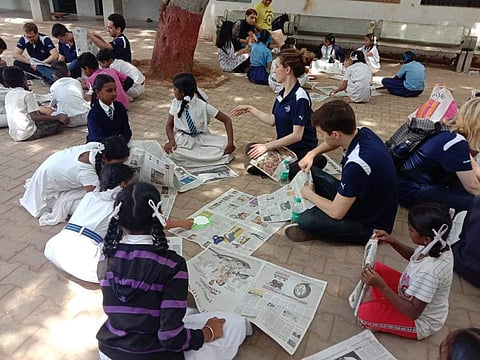

When Meenakshi was studying in a Telugu medium Government High School, she was a shy student and hardly spoke. But her behaviour changed gradually after the intervention of the Holistic Development Learning Centre run by Makkala Jagriti. The girl developed leadership skills, learnt to speak in Kannada and express herself better than other students. Once there was a cultural event organised by Makkala Jagriti at Chowdiah Memorial Hall and it was Meenakshi who led her school team. Such was the change brought in by HDLC programme. Like her, there are several students whose lives and perspectives have changed after the intervention of programmes by Makkala Jagriti.
Started in 2003 by Joy Srinivasan along with other like-minded individuals, the HDLC programme was among their first few programmes. Sunayana Chatrapathy, Chief Functionary of Makkala Jagriti, explains, "After two years of work on field and research in the education system, we realised that children coming from marginalised communities, especially those who are first-time learners are not learning effectively. There were several reasons for this — lack of a favourable environment, less focus on the children's holistic development, improper teaching and learning methodologies. That's when we started our first Holistic Development Learning Centre in 2005 near Adugodi in Bengaluru. Initially, we thought that only 30 to 40 children would attend our programme. But to our surprise, 100 kids would come to our centre every day from these marginalised communities living in the surrounding areas of Adugodi." Currently, the HDLCs are spread across Karnataka in districts including Bengaluru Urban and Rural, Gadag, Koppal and Tumkur. Over the past decades, the NGO has impacted over 30,000 lives through their HDLC programme alone.
Over a while, there were a few HDLCs set up around the city and the students' behaviour changed positively. She continues, "The teachers noticed that the students were not fearful like they were earlier. They would take interest in the subjects they were learning and answer the questions. As a result, they checked on what were the programmes these students were attending. The teachers in government schools soon understood that it was not the usual tuitions but a programme that was helping kids with their overall development. In 2008, a lot of teachers visited our centres and they appreciated our work. They asked us if we could establish the same centres in their schools. We agreed to it and established the same HDLCs in thousands of government schools in Bengaluru. The children would attend HDLC period like any other normal period they attended. They got to learn writing skills, dance, sing, play, speak on current issues in the society and so on."
And then came the SPICE Model. A programme that became extremely popular for its efficacy. Sunayana explains, "Apart from the academics, there are other factors that play an important role in children's life. It includes Social development, Physical development, Intellectual development, Creative development and Emotional development of a child. This is what our SPICE Model based upon. Our activities and curriculum have been designed in a way that children get to develop all these factors irrespective of where and what they study."
The HDLC's SPICE Model, therefore, promotes fun learning and not rote learning. Similarly, it is child-centric and not subject-centric. Sunayana says, "Instead of pushing or forcing kids to achieve the same goals in a particular time, we help them to develop their best version by discovering their strengths and weaknesses. We also see that the teachers and children sit in the same circle avoiding hierarchies or barriers. At the same time, we involve parents and provide them with workshops and sessions on parenting skills, treating children equally irrespective of their gender, getting to understand their routine and so on."
Since the HDLC programme is largely dependent on the centres or spaces set up in government schools, it was a bit tough to reach out to the children from marginalised communities during the COVID-19 lockdown. Sunayana and her team found new ways to approach these kids and see that they don't detach themselves from education. "We formed a WhatsApp group of parents and kids who were living in the cities or urban areas and had an android phone with them. We would WhatsApp them the activities, lesson plans etc so that kids continue studying and updated on their daily progress. In rural areas, we were not able to reach out to the kids through WhatsApp as their parents could not afford to buy a smartphone. Therefore, our teachers would go to these places that were non-containment zones and interact with students. Besides this, when the lockdown was relaxed and Vidyagama started, we prepared study kits for students. We would provide them to the teachers in schools directly and they distributed them among kids. They were quite happy with the kits as the worksheets were directly related to the lessons and children didn't require teacher's assistance," she concludes.
